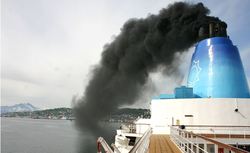New marine fuel oil arbitrage routes opening for tankers

‘Very low sulphur fuel oil is looking cheap in Europe and, like any other product out there that’s cheap in Europe, arbitrage opportunities open up,’ according to an analyst from JBC Energy.
Volatile crack spreads — the profit or loss derived from producing different refined products — as well as volatile crude prices, has led to rapidly changing trade flows and new tanker routes.
NEW RULES ON SHIPPING EMISSIONS ARE OPENING UP ARBITRAGE OPPORTUNITIES.
TRADING opportunities for aframax tankers shipping very low sulphur fuel oil to the US from Europe are emerging as the marine fuel oil market seeks to find equilibrium post IMO2020.
The arbitrage, or profit, to buy VLSFO in Rotterdam and ship it to the US Gulf for sale at a profit opened in February, according to presentations given at the JBC Energy London briefing today.
Traders could make approximately $3/bbl, according to the Vienna-based energy consultancy, which gave its annual briefing today as part of International Petroleum week.
“Very low sulphur fuel oil is looking cheap in Europe and, like any other product out there that’s cheap in Europe, arbitrage opportunities open up,” analyst Eugene Lindell from JBC Energy told the briefing.
“We see a situation where the arbitrage both to the US Gulf as well as to Asia is open again. Not only will (European refineries) have a tendency to produce less at these levels but you have a tendency to export more outside of Europe.”
The 4m bpd marine fuel market has been in a state of flux since the fourth quarter, ahead of the January 1 transition to a 0.5% sulphur cap on the world’s 60,000 trading fleet.
Volatile crack spreads — the profit or loss derived from producing different refined products — as well as volatile crude prices, has led to rapidly changing trade flows and new tanker routes, which are still evolving in 2020’s first quarter.
The briefing heard that since last July there had already been a “sharp uptick” in US Gulf imports of secondary feedstock such as Heavy Fuel oil and High Sulphur Straight-Run from Baltic ports replaced missing, heavy Venezuelan grades which have high sulphur content.
Venezuelan crude has been subject to US sanctions since January 2019. The cheaper, straight-run fuel, or HFO can be used by more complex refineries in the US Gulf to produce higher-value refined products, augmenting profits.
The transatlantic arbitrage for HFO was key to balancing the global market, JBC Energy concludes. HSFO is used by vessels which have scrubbers installed allowing them to use the marine fuel but remain compliant with sulphur cap regulations. However, the JBC Energy presentation concluded that “HSFO management doesn’t appear to be hard, the refining industry can easily cope” .
“The market is looking for equilibrium, it doesn’t know what the price should be,” said Mr Lindell said.
“Weaker” VLSFO prices in Europe reflected an “abundant” global supply.
“It is a product that can be easily produced, many refineries around the world have already jumped on the wagon,” he said.
“What is surprising is the European picture. We thought they (refineries and traders) would be short but it’s obviously long, and lower prices will lead to supply corrections. That said, there can always be a quick rebound.”
In oil trading parlance, a ‘short’ market is one where there is not enough supply to meet demand, while a ‘long’ market has a surplus of product.
The “short” Singapore market — where VLSFO prices have been as much as $150 per tonne higher than Rotterdam — was no longer as “short” as it used to be, according to JBC Energy.
“This shows nicely that you will see VLSFO imports coming from Brazil, and Europe. When the (arbitrage) window is open you expect it to be high, but when it is closed, this is not the end of the world,” Mr Lindell said.
He also added that China was expected to start producing and selling some 300,000 bpd of VLSFO following a January decision by the Chinese government to exempt the product from sales tax. This was “groundbreaking” for the global market.
“This will also ease that situation quite nicely,” Mr Lindell said.
“Ultimately what you will see is that the big high-volume, high-stem HFO going from the Atlantic basin to Asia is kind of over and is being replaced by smaller tanker sizes of VLSFOs … so aframaxes and panamaxes from Brazil all the way to Singapore. You’re not pulling in big suezmaxes and very large crude carriers anymore.”